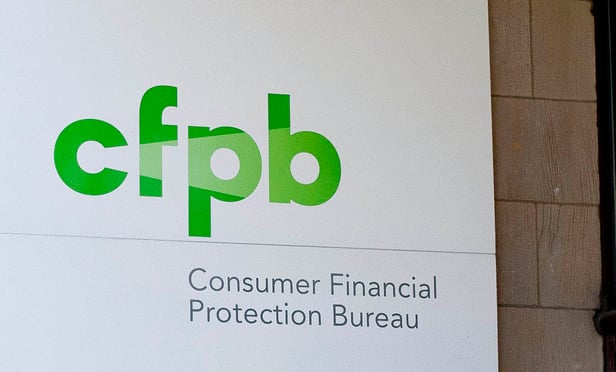 Consumer Financial Protection Bureau building in Washington, D.C. Photo by Diego M. Radzinschi
Consumer Financial Protection Bureau building in Washington, D.C. Photo by Diego M. Radzinschi
The CFPB's plans to expand its no-action letter policy and to establish a regulatory sandbox have received mixed reviews; credit unions support the efforts with some reservations, while consumer groups panned the idea.
And states attorneys general divided along party lines; 22 Democratic attorneys general blasted the proposal, while seven Republicans said they supported it.
Recommended For You
Consumer groups said the CFPB would overstep its authority if it implemented the programs.
The CFPB is proposing to streamline the no-action letter application by eliminating several elements it believes are "redundant or unduly burdensome."
The bureau's review would be focused on the quality and persuasiveness of the application, particularly on the potential benefits to consumers, the possible risk to consumers and the extent to which the letter is needed, according to the plan. The bureau said it would be expected to grant or deny an application within 60 days.
A 2016 no-action program required companies to share data about the product or service; the new proposal does not include that requirement.
In addition, the 2016 policy called for a staff recommendation of "no action," while the revised policy would be issued by CFPB employees who have the power to guarantee that no action be taken.
The agency's product sandbox would provide financial services companies with similar regulatory relief, but also would provide additional "safe harbors" for a specific period of time.
Any no-action letter program must guarantee that credit unions are given equal access to the program and must be limited in scope, Alexander Monterrubio CUNA's senior director of advocacy and counsel said.
The agency should not simply reject proposals it does not support; those applying should be given the opportunity to improve its proposal in order to obtain CFPB support, he added.
And CUNA endorsed the proposal to allow groups to apply for the letters, adding that would encourage more credit unions to apply.
Andrew Morris, NAFCU's senior counsel for research and policy said that while the trade group supports the proposal, it should not be a way to simply get around agency rules.
"NAFCU would also like to emphasize that the preferred mechanism for regulatory relief would be for the Bureau to directly amend its rules and regulations when burdens are identified," he said.
Morris complimented the CFPB for attempting to streamline its program but encouraged the agency to coordinate with state officials in advance of issuing letters that might exempt an applicant from agency rules.
But the CFPB is attempting to circumvent the traditional rulemaking process, the 22 Democratic state attorneys general said.
The proposals would "permit the CFPB to exempt – in some cases indefinitely – companies and even entire industries from certain consumer protection laws and regulations through a process designed to value speed over careful decision-making," they said.
The seven GOP attorneys general said they support the regulatory sandbox proposal.
"Regulatory Sandbox programs are effective tools that allow consumer protection regulators to balance their duties to prevent and address harm while also getting out of the way of responsible innovation," they said.
Consumer groups, including Americans for Financial Reform and the Center for Responsible Lending accused the bureau of removing consumer protection from its proposals.
"Individual Bureau staff would be able to rubberstamp applications for relief with little review based on one-sided presentations from regulated companies that may be seeking to evade the law or that are offering potentially risky new products or services," they said.
© 2025 ALM Global, LLC, All Rights Reserved. Request academic re-use from www.copyright.com. All other uses, submit a request to [email protected]. For more information visit Asset & Logo Licensing.







